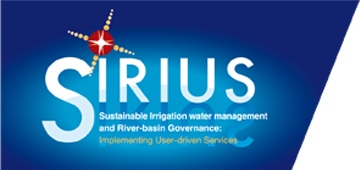Workpackages
The backbone of the downstream service stimulation and validation activities will be a set of eight Case Studies, to be performed in selected pilot areas in Spain, Italy, Romania, Turkey, Egypt, India, Mexico, and Brazil (abbreviated in the following as ES, IT, RO, TR, EG, IN, MX, and BR, respectively). These Cases have been selected according to the diversity of conditions (source of water, technical and management skills, etc.) across the European and Southern Mediterranean, Asia, and Latin America and to the availability of data, information, and knowledge from previous or ongoing activities. The project’s focus on eight different pilot areas creates a matrix-like structure with the same overall objectives and approaches applied in these different environments. The key characteristics of each pilot area will result in different aspects of the activities being emphasised in each.
To plan and manage the project, Sirius is structured in management activities (one WP: WP9) and thematic activities (8 WPs: WP1- WP8). The project objectives are mapped onto the research activities of the workplan in an iterative way:
WP1 (“User community”)To prepare the service environment by strengthening the participatory process which is necessary for efficient and effective irrigation water resources management and by jointly developing users’ requirements portfolios that lead to sustainable future community agreements for irrigation farming practices assisted by GMES services in each pilot area, based on cooperation of all stakeholders.
WP2 (“Technical system and user interface”)To strengthen the current version (global, local, portable modes) of the online System of Participatory Information, Decision-support, and Expert knowledge in Riverbasin management (SPIDER) developed in PLEIADeS in two ways: placing it robustly within the overall framework of the GMES SDI, whilst ensuring it is operational on the ground with the network of local ppgis** communities.
WP3 (“Portfolio”)To further develop, validate, and consolidate the product generation algorithms for the SIRUS portfolio and to operationalize them as far as possible while maintaining user control procedures where needed. This includes integrating data from all sources (EO, non-EO, model).
WP4 (“Portfolio production line”)To set up and implement the SIRIUS portfolio production line, including purpose-oriented quality control, merging data streams from EO (“virtual constellation” concept), non-EO (insitu, surveys), and models. To generate products for participatory service assessment with users during one growing season.
WP5 (“Service Provider community”) To develop and employ a framework of business strategies to stimulate operative and sustainable SIRIUS service activities capable of providing benefits to the user community of water resources management
WP6 (“Participatory multi-stakeholder service assessment”)To guide the local user community in a participatory multi-stakeholder process through the set up, test implementation, training, and evaluation of the SIRIUS services in representative pilot cases..
WP7 (“Sustainable implementation”)To evaluate/assess the social, political, cultural, and economic environment for the sustainable implementation of the SIRIUS Service in a holistic/systemic framework (covering governance, policy, community-building, technical infrastructures, funding, and training) and to create the necessary/corresponding roadmaps
WP8 (“Communication”)To disseminate the project activities and results in creative ways and to raise awareness on the potential benefits of GMES for sustainable irrigation and food production in the wider community.



